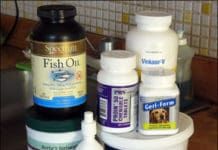A Homemade Dog Food Diet
As more and more owners make the decision to switch their dogs to homemade diets, we grew increasingly aware of the importance and urgency to supply appropriate guidelines that could help people create homemade diets that would meet their dogs' nutritional needs. Over the past five months, we've presented information on homemade diets, cooked and raw, with whole bones, ground bones, or boneless. During that time, we've learned about some new products, read a great new book, tried out some sample pre-mixes and freeze-dried foods, and responded to questions from people about issues raised in our past five articles and points that would benefit from clarification. We'll discuss these topics in this final installment of our series.
How Dog Food Has Changed Due to The Pet Food Recall
There have been pet food recalls before, and there will be recalls in the future, but the event of early 2007 will probably be recorded as the costliest pet food recall in history. However, it’s our hope, and the opinion of many, that the lessons learned from this infamous event should prevent any similar large-scale pet food disaster from happening ever again. Below, seven pet food company executives explain how the operations of their companies have changed since the recall, and what dog owners can do to protect their companions, should disaster ever strike again.
Raw Dog Food Diet Recipes
Feeding a raw dog food diet to your dog is quite simple, especially once you have a system in place. Though like anything else new, it can seem very complicated when first starting out. These sample dog food diets should be helpful to dog caretakers who are considering feeding a raw diet. Even those who have been doing it for a while may learn some new tricks to make the process of finding, preparing, and storing home prepared dog food simpler.
Home Prepared Dog Food Recipes
Over the past three months, weve provided rules and guidelines for feeding a homemade dog food diet, but getting started can still seem overwhelming. This month, well hear from owners who feed their dogs a homemade diet, and learn from them how they go about it, including tips and tricks for finding, preparing, and storing the dog food.
Home-Prepared Pet Food Diets
Those of us who feed our dogs a raw diet that includes bones believe that this is the healthiest, most natural diet dogs can eat. But not everyone is comfortable feeding such a diet to their dogs. Here are directions for feeding your dog a cooked diet, or a diet that includes raw meat but no bones. Your dog will still benefit from a variety of fresh foods in proper proportions, regardless of how theyfre prepared. It takes a little more work to ensure that a cooked diet that does not include bone meets all of your dogfs nutritional needs. Wefll explain how much calcium, and in which form, youfll need to add to his diet.
Ongoing Pet Food Recalls
The latest twist in the pet food recall involves foods that contain contaminated ingredients – ingredients that don’t appear on the list of ingredients that are listed by law on the product label. We’re frustrated, given that we’ve spent 10 years telling our subscribers to read product labels – and make purchasing decisions based on the ingredients that are on the labels. Now, it seems to be developing that “what’s in the bag” (or can or pouch) is accurately described by the product labels only sometimes. The industry owes consumers some solutions; how can we ever trust that what’s in the package is what the label says it is?
Dog Food Reviews Follow-Up
As a new subscriber to Whole Dog Journal, this is the first time I have received the issue that contains your recommended top quality dry food for dogs (February 2007). I was surprised that Solid Gold dog food was not part of your list. I recently lost a 14-month-old Golden Retriever to cancer. Since that experience, food quality is my top priority for my dogs
Angry Over The Recent Dog Food Recall
not in China or elsewhere?
Do you intend to do an investigation on the origin of ingredients in foods? It would be a good idea to list all the brands that are manufactured in the U.S.
Pet Food Disaster
In October of 2004 we published an article (“When Foods Go Bad”) that discussed how owners could protect their pets from serious harm from contaminated or toxin-adulterated pet food. It outlined the lessons learned from the three previous commercial pet food disasters: the 1995 event involving vomitoxin in Nature’s Recipe dry foods; the 1998 aflatoxin event involving dry dog foods made by Doane Products; and the still-unidentified problem that sickened and killed dogs who ate certain lots of Go! Natural dry food in 2003.
Home-Prepared Dog Food
including ground meat
Whole Dog Journal’s 2007 Canned Dog Food Review
How should you choose a canned food for your dog? To start, by looking past its advertising in dog magazines or its front label. We suggest you focus on its ingredient panel, its guaranteed analysis (GA), and finally, on its performance in feeding trials with your dog.



















